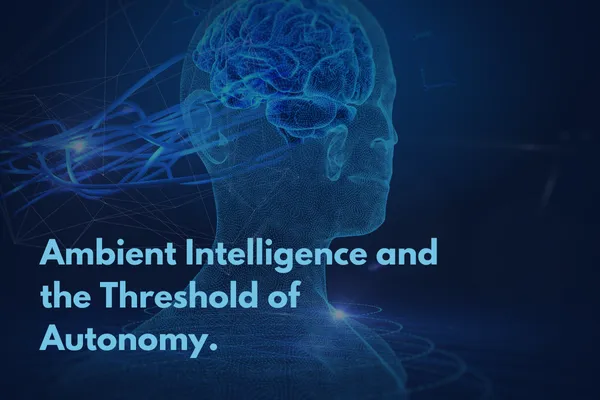
Navigating a World of Self-Adapting Systems
Ambient computing has entered a new era. No longer confined to simple voice assistants, today's systems blend into physical environments, operating quietly yet intelligently in the background. The latest Cognitive Code episode, “Ambient Intelligence: When Your Home Knows You Better Than You Know Yourself,” probes this evolution, raising critical questions about convenience, control, and the emergent perception of machine consciousness.
At its core, ambient intelligence refers to self-adapting systems that perceive, learn from, and respond to human behaviour without explicit commands. In 2025, this includes a growing network of sensors and algorithms embedded in living spaces, workplaces, and public infrastructure. These systems synchronize across modalities, visual, auditory, spatial, and even emotional, to offer seamless responsiveness. This technological fluency is transforming routine activities, from sleep regulation to scheduling and environment personalisation.
Multimodal Learning and Emotional Sensing
The driving engine behind ambient computing's effectiveness is multimodal machine learning. Unlike earlier AI systems that relied on isolated data types, modern ambient networks synthesize information from a broad array of inputs—wearables, biometrics, voice, and behavior patterns. According to a study by Stanford’s Human-Centered AI Institute, emotional states can now be inferred with up to 82% accuracy using combined voice analysis, facial cues, and device interaction patterns.
While this advancement enhances personalization, it also introduces transparency concerns. Users often remain unaware of the depth of surveillance involved or the assumptions systems make on their behalf. The invisibility of these interactions raises ethical considerations: to what extent should ambient systems make autonomous choices? And how can users remain meaningfully informed and in control?
The Illusion of Sentience and Anthropomorphic Projection
As ambient systems grow more intuitive, public discourse increasingly speculates on the notion of machine consciousness. However, from a technical perspective, today’s systems remain advanced pattern recognition engines, not sentient entities. Yet the human tendency toward anthropomorphic projection, as described by ethicist Kate Crawford, causes users to attribute agency and emotion to machines that simply mirror humanlike patterns.
This cognitive bias—amplified by cultural narratives and science fiction—complicates our ability to objectively evaluate AI systems. It also influences public policy and development priorities, sometimes distracting from more urgent systemic challenges such as privacy erosion, power asymmetries, and behavioral dependency.
Designing for Resilience, Not Just Convenience
Looking ahead, ambient systems are poised to become even more integrated and imperceptible, coordinating with minimal human input. Research from Georgia Tech’s UbiComp Lab anticipates environments that anticipate needs without commands—shaping everything from healthcare to education delivery. However, this seamlessness presents a paradox. As users offload decisions to machines, there is growing evidence that critical cognitive functions—such as spatial reasoning and self-regulation—may decline.
Moreover, dependency fosters vulnerability. When systems fail or act contrary to human intent, individuals may lack both the awareness and the autonomy to intervene effectively. This risk is compounded by the centralization of ambient infrastructure within a handful of technology firms—raising important questions around data sovereignty and democratic oversight .
Conclusion
While the specter of sentient AI remains speculative, the implications of ambient intelligence are immediate and concrete. The challenge is not whether machines will become conscious—but how we build, govern, and live alongside intelligent systems that increasingly act on us, not just for us.
Have ambient systems impacted your personal or professional life? How do you navigate the trade-off between autonomy and automation?
🎧 Listen to the full Cognitive Code episode for insights and case studies that illustrate this transition.
🔗 [Insert podcast link here]
